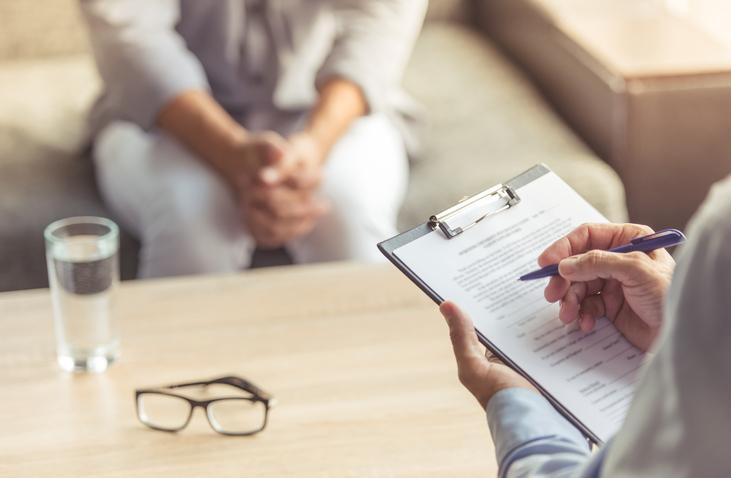Have you ever wondered how good you are at listening to other people? Knowing how to really listen is a skill that is developed over time and practice since although it seems that we all listen to others, not everyone does it in the appropriate way. People who are very empathetic with others and those who also tend to consider themselves successful in the workplace and socially, tend to have this skill well developed.
¿What is active listening How can we know whether or not we are listening adequately to others? How can we develop active listening? What are the benefits that actively listening to other people brings to us? In this PsychologyFor article, we will talk about Active listening: characteristics, exercises and examples. In addition, we are going to explain in detail everything you need to know about this topic.
What is active listening? Definition according to psychology
When we talk about active listening we are referring to a way of communicating where the aim is to let the person know that they are communicating something that really matters. you are being cared for and understood< When we actively listen to someone, we do it consciously, that is, we make an effort to focus all our attention on what the other person is communicating to us and not only that but we also pay enough attention to really know how they are speaking. feel.
It is necessary to mention that it’s not about pretending that you are paying all your attention to the other person but rather giving them all your attention and letting them know that what they are telling us is really important.
Characteristics of active listening
In order for us to consider that we are really listening actively, when we listen we must meet some of the following characteristics:
- Do not make interruptions to the person who is communicating something to us.
- Focus all our attention in what they are telling us.
- Pay attention not only to what they tell us but also to their gestures and words.
- Show a good disposition to listen to others.
- Correct what the other person tells us to be sure that you have understood it adequately.
- Do not make hypotheses or assumptions about what the other person is going to tell us.
- Do not get distracted and think about something else when the other person is talking to us.
- Show the other person that you are really paying attention.
- look in the face to the person who is speaking and pay attention to their facial expressions.
Active listening: exercises and examples
Normally, we are not used to actively listening to others and we think that just by being present when someone is communicating something to us and when we hear what they are telling us, we are listening to them as we should and this is not the case.
6 Active listening exercises
Some exercises that we can carry out to develop our listening skills are the following:
1. Don’t judge
Every time someone is telling you something, listen only carefully and avoid judging them. Remember that this person is talking to you about what they feel or the way they perceive things and this does not necessarily have to do with the way you do it.
- Example: A friend is telling you about his/her fear of approaching the person he/she likes since it is very difficult for him/her to start a conversation with that person and start getting to know him/her. So in this case the last thing you should do is start judging him and thinking or saying things like “how stupid you are”, “how can you be afraid to talk to someone?”, etc. Better try to enter his world and understand him since we are all different and what is very easy for some can be the opposite for others.
2. Avoid giving advice
In the vast majority of cases, when a person is telling us something that happened to them, they do so solely to vent and because they like to feel that someone is there to listen to them. So if the person doesn’t ask you, avoid starting to give them advice, which will surely be based on your experience and not the other person’s.
- Example: When a friend is telling us how sad they are for having ended their relationship and begins to cry and vent, so many times we tend to start giving them advice or saying things to try to “reduce their pain” when that person just wants to be heard.
3. Don’t interrupt the other
You should never interrupt the other person when they are speaking unless it is absolutely necessary since, for example, what you are going to tell them is something extremely important or you need to ask them to repeat something they are talking about because you did not understand well, etc.
- Example: When someone is telling us something and we suddenly interrupt them to tell them something that happened to us similar to what they are telling us. The best thing is that we wait for the person to finish speaking and then we can also share our experience with him/her.
4. Pay attention to the details and let them know
When you talk to your interlocutor, try to mention some detail that he told you the last time you spoke or on previous occasions that you have done so, this will cause him to have more trust in you, he will feel more listened to and valued and will make him dare to open up more. with you.
- Example: When someone is telling you something that happened to them and at that moment you make a small comment remembering a situation that happened to them in the past and that has to do with what is happening to them in the present.
5. Paraphrase
When you are talking to the other person you can repeat parts of the last sentences they say in order to make it clear to them that you are listening to them and to make sure that you are understanding them correctly.
- Example: Your neighbor is telling you how bad he had it when he was a child since he suffered physical and psychological abuse from his father, so you can paraphrase things like: so your father abused you when you were a child, etc.
6.
Reflects the other person’s feelings
Apart from paraphrasing things that your interlocutor is saying, you can also mention some aspects that you can interpret about how he felt in the situation he was in.
- Example: Your coworker is telling you how bad it was when her grandmother was sick. So you can say things like: “I imagine you must have felt very sad and helpless”, “how sad it is when grandparents get sick”, etc.

Benefits of active listening
There are many benefits that come with knowing how to listen to other people actively, however, among the most important are the following:
- It helps the person resolve interpersonal conflicts more easily.
- Increase self-esteem of the person speaking since they are made to feel important and valued.
- Misunderstandings are avoided.
- Increases the level of empathy that one has towards other people.
- The person listening can increase your level of general culture and intelligence by staying more easily with what the interlocutor communicates.
- The social skills of the person listening are further developed.
- An image of intelligence is projected towards others by noticing that all the attention is paid to the other person.
- Improve interpersonal relationships<
This article is merely informative, at PsychologyFor we do not have the power to make a diagnosis or recommend a treatment. We invite you to go to a psychologist to treat your particular case.
If you want to read more articles similar to Active listening: characteristics, exercises and examples we recommend that you enter our Cognitive Psychology category.
Bibliography
- Codina, ACJ (2004, September 3). Know how to listen. A valuable intangible. Retrieved January 24, 2019, from https://www.redalyc.org/pdf/549/54900303.pdf
- Navarro, PFN (2017, October 5). Active listening: practical techniques to become an expert. Retrieved January 24, 2019, from https://habilitasocial.com/escucha-activa/









